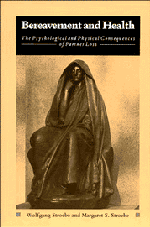Book contents
- Frontmatter
- Contents
- Preface
- 1 Introduction
- 2 The symptomatology of grief
- 3 Is grief universal? Cultural variations in the emotional reactions to loss
- 4 Depression models of grief
- 5 Stress models of grief
- 6 Mediators between stress and illness
- 7 The loss effect: health consequences of marital bereavement
- 8 Risk factors in bereavement outcome
- 9 Reducing the risk of poor bereavement outcome
- References
- Author index
- Subject index
6 - Mediators between stress and illness
Published online by Cambridge University Press: 03 May 2010
- Frontmatter
- Contents
- Preface
- 1 Introduction
- 2 The symptomatology of grief
- 3 Is grief universal? Cultural variations in the emotional reactions to loss
- 4 Depression models of grief
- 5 Stress models of grief
- 6 Mediators between stress and illness
- 7 The loss effect: health consequences of marital bereavement
- 8 Risk factors in bereavement outcome
- 9 Reducing the risk of poor bereavement outcome
- References
- Author index
- Subject index
Summary
Stressful life events like the loss of a job or the death of a spouse do not operate in the same manner on one's bodily system as the entry of some alien bacterium or even the noxious physical or chemical stimuli studied by Selye. And yet, despite some of the weaknesses in the research on cumulative life stress discussed in the last chapter, there can be little doubt that the experience of stressful life events is associated with an increased risk of a wide range of physical as well as mental disorders. Furthermore, it will be argued later (Chapter 7.4) that the widowed have a higher mortality than married individuals from causes such as arteriosclerotic heart (including coronary) disease, cancer, tuberculosis, and even liver cirrhosis. There is also some evidence that bereaved individuals have a higher incidence of infectious disease during the first year after their loss (Maddison & Viola, 1968). Thus, a final and probably most intriguing question still to be answered is how stressful life events can lead to health deterioration.
This chapter will discuss two types of mechanisms assumed to mediate the impact of psychosocial stress on health. First, the experience of stressful life events is likely to lead to a number of behavioral changes (e.g., changes in eating habits and health care, increases in smoking, alcohol and drug intake) which are known to have a deleterious effect on health.
- Type
- Chapter
- Information
- Bereavement and HealthThe Psychological and Physical Consequences of Partner Loss, pp. 101 - 120Publisher: Cambridge University PressPrint publication year: 1987



